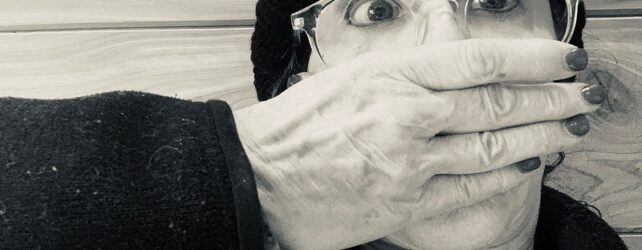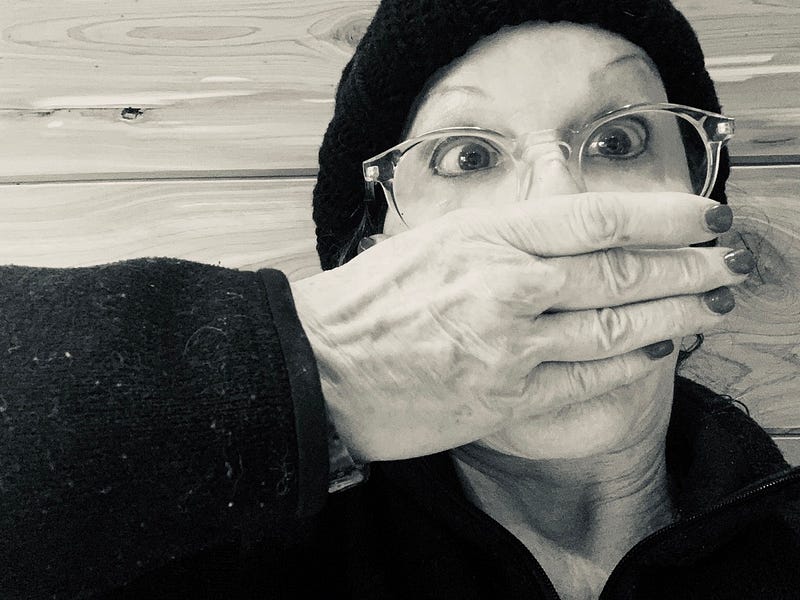
What my Four Marriages Have Taught Me — by a Marriage Therapist.
I learned the hard way to have the relationship I desired all along.
One might think that a marriage therapist who has four marriages under her belt would hide her head in shame, but the most important lesson I’ve learned is to not do that. Instead, I look back on each relationship, three of which ended in divorce, to see how they helped me come to know myself. I’ve learned a lot from those experiences and more from my education and working with the thousands of people seen as a Marriage and Family Therapist. Maybe I’m trying to atone for bad decision-making, but whatever it is, I’ve gained a lot of wisdom that may help others.
Marriage One. “This is the best I can do.” Lesson: Don’t settle.
Raised by depression-era parents from the south, at 24 I felt pressure to not become an “old maid,” which is someone who can’t attract a husband and spends her life ashamed and alone. Ridiculous? Yes, but that was the culture I was brought up in. In addition, my dad told me that men were meal tickets, just “Look good, be smart and college educated, and you’ll attract the top of the heap,” he said, so that was my plan, though I shudder thinking of it now. Even though I got a college degree, I never even thought seriously of a career or of supporting myself. My family conditioned us well: They would applaud when the four daughters brought home men who were prominent with great financial potential, and condemned anyone who wasn’t, so I understood what the mission was.
From the moment I married Husband Number One, I knew I was a future divorced woman. I had pleaded with a family member the night before the wedding to help me cancel the wedding, but she said it was too embarrassing, so I should just go through with it and divorce him later — that was terrible advice!
I had loved him at one time. He introduced me to a new world … he was the only grown up I had dated — wining and dining versus going Dutch at Roy Rogers restaurants. I loved the change and being with someone who had a nice car, who had finished his education and was well into his career. His personality was a little weird, he made wise cracks constantly that didn’t sit well with me and he was obsessed with my weight, but I was already under his spell and overlooked it. Then he began to cheat, usually running back to his former girlfriend. We’d break up, and he’d find me and beg to make up. For two years there was drama, tears, and turmoil, and by the last time we broke up I had lost all feelings for him. He must have sensed he was losing me for good, because to get me back one last time he stalked me at my health club, waited to catch me in my apartment parking lot, begged me to meet him for dinner, and when I did, he proposed, and I accepted. Why? Insert self-defeating thinking: I figured I was not good enough to attract a better mate than this, that I could get my feelings back for him if I tried, and that he would never hurt me again. I was wrong on all accounts. We divorced after 16 months of marriage, when he ran off with the receptionist from his job and moved out-of-state.
Take away: Don’t ignore red flags or sell yourself short or shoot too low in the type of mate you can attract — ones who cheat repeatedly will likely always cheat, despite what they say, and the same goes for those who flake out of relationships, then beg to come back later. Don’t choose a mate to please your family, and when a person shows you who they are, believe them the first time. And, if your self-esteem is on the floor you may be willing to accept the dregs of human behavior, a form of self-sabotage.
Marriage Two: Make sure you know who you’re marrying. Lesson: Spend time getting to know someone, at least three years, as people can and will hide their dysfunctional behavior during the dating process.
Oh, how attracted and in love I was — ahh butterflies. I couldn’t imagine my heart could ever change toward Number Two, but it did, and looking back I feel he did everything he could do to change my heart. He was seductive in the beginning, very loving, enthusiastic and affectionate, and then one day about two months into our marriage and nine months into our relationship, I cozied up to him and he turned me away, beginning a trend of rejection that went on for eight years — in an instant he went from my dream man to an icy, mean, shut-down man. He was a surgeon with an ego and had to be the boss. He looked down on anyone who didn’t work as hard as he did, and began to criticize me, my choices, told me my life was a waste, and did everything he could to avoid emotional and physical connection. He was a workaholic beyond anything I have ever seen, always adding more to his plate. We had two children, who truly were miracle babies, and I did all I could to hang on. I begged and pleaded with him to get help, to find out what was wrong. He said he would, but never did, and so I became a single mom at age 35. Needless to say, after the divorce he was an angry co-parent who was exceedingly difficult to deal with.
Take away: Date someone for at least three years so you can see the patterns of their personality. Anyone can show only their best self for a year or so. Our romance was brief, and it was long distance. He was finishing his medical residency at the time and was extremely busy, so we had not spent nearly enough time together to make a marriage decision. The truth of who a person really is will show up, so give it time, marriage is a huge decision, and divorce is so awful and painful, it’s worth it to take the time to set yourself up for success.
Marriage Three. The Most Painful Lesson. Lesson: Kill your ego or die.
This was a crash course in all I still hadn’t learned in the other two relationships. When I met this man, he was a district judge. He was hilarious and beloved in the community, poised and appropriate, but it was all a public persona. My initial concern was that he seemed to pine for old girlfriends and lost relationship opportunities, somewhat like a teenage girl. I’d never heard a man talk about relationships so much, so feeling weirded out, we started off as friends. He admitted to cheating on every woman he had ever been with, and as my feelings began to turn romantic, I told myself “Our love will be different, he will be faithful to me.” Although my self-esteem was still truly horrible, my ego was pretty healthy, and it told me the lie that I was quite exceptional and a man would behave differently in a relationship with me than he had any other time.
While dating I began to experience his tumultuous moods. Everything I did reflected on him. I wrote a column in the local newspaper and if I wrote something he didn’t like, or that his many friends commented to him about, he would throw a tantrum and tell me I couldn’t do that. This was unnerving.
The judge’s father had been a US Congressman in the San Antonio area for 38 years. He was a legend and an icon; his own man. I never would have married the moody judge, but when he told me that his father was going to retire and he was going to run for his seat, my ego had to jump on the train to Washington. It was egomania catnip for me and my family, marriage to a United States Congressman. Number Three had been single for years and had always dated women 20+ years younger. I was more age appropriate and had two young children — a ready-made family to cure his reputation as a playboy, a great political move, “Surely he wouldn’t want to blow it” I said to myself.
I calculated that once he was elected Congressman he would have to behave. We married, and when we did, his attitude toward me and my kids worsened. Everything we did was a direct reflection on him, so we had to be controlled. He pitted me against the children, one of the three of us was always in his doghouse and he would refuse to be around whomever that was. If I dared to side with one my children, there would be hell to pay.
Like Dr. Jekyll and Mr. Hyde, he could go from charming and romantic to Satan himself, all in a nanosecond, always behind closed doors, and what triggered him could not be predicted. He would yell at me, accuse me of ridiculous things that never happened, have expectations of me that had never been communicated, like how I had not drawn a hot bath for him when he came home from Washington, though he never told me he wanted one. When angry he would not speak to me for a week or two at a time, sometimes moving in with his female cousin. And then there were other types of abuse, a time or two he shoved me on the floor as I approached to try and calm him down. One memorable evening he was hugging me when suddenly his mood turned dark and he dug his nails in my back so hard I had marks for weeks. The fact that he was now a US Congressman had not made him a better man; he was worse than he ever had been.
My children later told me they would hear him yelling at me in our bedroom and me crying. They were so scared of him and his protests when interrupted that they when we he and I were in the bedroom they would speak to us through the air conditioning vent. This breaks my heart; I should never have exposed them to such ugliness. But I literally sold my soul to the devil to have the Washington D.C. political experience, one of my greatest regrets.
From the time we married he began to talk about the fact that divorce was inevitable, and he would say this in front of friends when we were out to dinner. I didn’t want a third divorce, but I knew it was inevitable. He told all of his friends that my children and I were crazy, he hated our dogs and cats, and once beat my Chihuahua, Belle, after assuming she had defecated in his briefcase. It had been the cat. I told him it was Karma and he lunged for me, I dived into the bed and hid within the covers, holding poor Belle under me so he couldn’t hurt her again. Emotionally worn down, I searched for the courage to leave, but in the end, didn’t need it.
He left me for another woman after just over two years. After we separated, almost every dear friend I had turned their back on me and chose to remain friends with the powerful Congressman. All the prominence and rubbing elbows with the powerful, all the things my ego had worked for, was gone. My health plummeted, but things eventually improved as I started graduate school to become a Marriage and Family Therapist. Knowing I could not survive another devastating relationship, I promised myself that I would spend time in a counselor’s office and the university library figuring out the me that had allowed all of this to happen. As I began to learn about mental health, personalities, and studied what healthy relationships consist of, I came to understand that my own misguided ego had been my guide in major life decisions, keeping me from a peaceful and loving life. This brutally honest recognition of what I had done brought to the conscious level all my ego had been driven to achieve. Recognizing it and taking ownership of it killed it’s influence on me once and for all.
Take away. My shallow misery-seeking ego had to die. My ego was dedicated to upping her station by marrying high profile, successful men, all to impress herself and her egomaniac family. I had loved the men I married, but none of them were capable of a healthy adult relationships. I got into each mess by ignoring the red flags that had waved all around me when during our initial romance, being wholly ignorant of how healthy people behave. If I was to love again, and I wasn’t sure I wanted to, it had to be with someone who was commitment-oriented and emotionally mature. I was ready to accept a simple life, out of the public eye; to just learn, grow, work and support myself and my children, to be still and let life unfold.
Epilogue.
In the years after Number Three, I learned to be happy alone. This was an important and necessary step. I learned about trauma and emotional maturity and consciously grew myself up. I lived the simple life, became a licensed counselor, and after about five years started to date again. This time I didn’t miss or ignore the red flags that waved in my face when a man showed me who he was, and there were a lot of red flags, probably in 98 percent of the men I met. I never had a boyfriend or significant other for almost 10 years, instead I concentrated on schooling and getting licensed, and being as emotionally healthy as I could.
Then I met someone. He had all the things I knew had to be there — he was kind, solid and consistent. He had been married for 25 years, and his wife had opted out of the marriage. There was no temper, flakiness, workaholism, and he had nothing to prove as far as his ego was concerned. He was solid in every way, and he adored and accepted me exactly as I was.
Marriage Four. True, mature love is gentle, comfortable, consistent.
Now I was able to apply all of my growth and relationship knowledge and skills I’d learned to have the type of loving relationship I had always wanted. When we fell in love it was calm and comfortable, like a foot slipping into the most comfortable shoe. My other relationships had been like fireworks shows that quickly burned out. Could this calm and certain feeling be real love? I came to understand that it is, that mature love is not intoxicating, but a solid attachment and connection that lasts the long term. It’s a feeling of being there for one another, two independent individuals with lives of their own, coming together to make each other’s life better together. Having been through Relationship Hell, I will never take him for granted.
I spend my days working with people who are making the many mistakes I used to make. If I can save one individual or family from relational misery or divorce, and guide them from dysfunctional to functional behavior, my many mistakes and lessons will have been worthwhile. It’s my fondest desire that no one else has to learn the hard way.
Becky Whetstone, Ph.D., LMFT, LPC is a Marriage & Family Therapist and Licensed Professional Counselor in private practice in Little Rock, Arkansas, and an LMFT in Texas.* She is a marriage crisis and relationship specialist. Visit her web site at www.doctorbecky.com. Contact her at becky@doctorbecky.com.
*To search for her license, look for her legal name, Becky Whetstone Cheairs.





 Becky Whetstone is an Arkansas native and has a Ph.D. in Marriage and Family Therapy from St. Mary’s University in San Antonio, Texas. She is a Licensed Marriage and Family Therapist (LMFT) in Texas and Arkansas.
Becky Whetstone is an Arkansas native and has a Ph.D. in Marriage and Family Therapy from St. Mary’s University in San Antonio, Texas. She is a Licensed Marriage and Family Therapist (LMFT) in Texas and Arkansas. 



















































































































